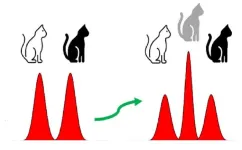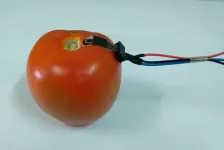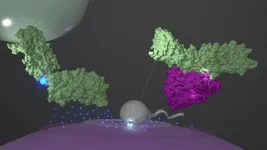(Press-News.org) A team of researchers from the Badalona Applied Research Group in Oncology (B·ARGO) and the Urologic Tumours Unit of the Institut Català d'Oncologia (ICO) and the Germans Trias i Pujol Research Institute (IGTP) have found a new therapeutic strategy for patients with a specific subtype of metastatic prostate cancer resistant to standard chemotherapy treatment with docetaxel.
In this study, published in the journal Frontiers in Pharmacology, they propose a new treatment based on a combination of kinase inhibitors in patients who inevitably stop responding to docetaxel. The team found that resistance to this drug is associated with the hyperactivation of the cellular pathways PI3K/AKT and MEK/ERK and have explored the possibility of inhibiting these pathways as a new therapeutic strategy in patients who maintain the function of PTEN, a negative regulatory protein of the PI3K/AKT pathway.
The results of the study have been satisfactory and, for this reason, the team wants to conduct a clinical trial to assess the safety and efficacy of this combination in patients with prostate cancer resistant to docetaxel. Vicenç Ruiz de Porras and Adrià Bernat-Peguera, ICO-IGTP researchers and co-first authors of the study, state that the results of this study "open the door to a new therapeutic strategy for those patients with PTEN wild-type tumors, who have progressed to docetaxel and in whom, unlike PTEN null patients, the efficacy of AKT inhibitors in monotherapy has not been demonstrated."
END
New therapeutic strategy for metastatic prostate cancer patients resistant to standard treatment
A team of researchers has identified a combination of drugs that could change the treatment of patients with prostate cancer resistant to the drug docetaxel
2024-02-02
ELSE PRESS RELEASES FROM THIS DATE:
Audiogene, the first clinical trial in France for a gene therapy to treat hearing loss in children
2024-02-02
The aim of this clinical trial, which has just received approval in France, is to assess the safety and efficacy of a new gene therapy drug in children aged between 6 and 31 months with profound hearing loss. Audiogene was developed by a French consortium composed of teams from the Hearing Institute, an Institut Pasteur research center; the ENT Department and Pediatric Audiology Research Center at Necker-Enfants Malades Hospital (AP-HP); Sensorion and Fondation Pour l'Audition. The trial has also been submitted to other European countries and is currently undergoing assessment.
Audiogene is the first clinical trial in France to test a gene therapy drug, SENS-501, ...
Vaccine targeting KRAS in pancreatic and colorectal cancer shows promise
2024-02-02
A new vaccine shows encouraging early results as a potential off-the-shelf treatment for certain patients with pancreatic or colorectal cancer, according to a study co-led by researchers at Memorial Sloan Kettering Cancer Center (MSK). The vaccine targets tumors with mutations (or changes) in the KRAS gene, a driving force in many cancers.
This cancer vaccine is different from another type of pancreatic cancer vaccine, which is custom-made for each patient using messenger RNA (mRNA). Both are therapeutic vaccines given after surgery ...
A physical qubit with built-in error correction
2024-02-02
There has been significant progress in the field of quantum computing. Big global players, such as Google and IBM, are already offering cloud-based quantum computing services. However, quantum computers cannot yet help with problems that occur when standard computers reach the limits of their capacities because the availability of qubits or quantum bits, i.e., the basic units of quantum information, is still insufficient. One of the reasons for this is that bare qubits are not of immediate use for running a quantum algorithm. While the binary bits of customary computers store information in the form of fixed values of either 0 or 1, qubits can represent 0 and ...
Biodegradable sensor monitors levels of pesticides via direct contact with surface of fruit and vegetables
2024-02-02
Researchers at the University of São Paulo (USP) and the Federal University of Viçosa (UFV) in Brazil have developed a sustainable sensor that can be placed directly on the surface of a vegetable or fruit to detect the presence of pesticides. Known for this reason as “plant-wearable”, it is made of cellulose acetate, a material derived from wood pulp.
The device has the potential to help assure food safety in a world that increasingly suffers from a shortage of food and the environmental and health problems caused ...
Paper: Multistate foodborne illness outbreaks impact restaurant stock price, public perception
2024-02-02
CHAMPAIGN, Ill. — As demand for food from restaurants soars in the U.S., so does the importance in understanding the impacts of foodborne illness outbreaks. A new paper co-written by a University of Illinois Urbana-Champaign expert in food marketing and food policy finds that outbreaks spanning multiple states bring swift financial losses, increased media attention and a public-relations hit that makes smaller outbreaks more financially damaging.
In the U.S., more than 60% of foodborne illness outbreaks occur at restaurants, and the vast majority of those outbreaks are confined ...
Identifying genomics markers to predict radiation sensitivity
2024-02-02
As the effectiveness of radiotherapy varies greatly between tumours, finding gene signatures to predict the radiation response could better guide the clinicians to personalize treatment plans. Professor Venkata Manem, affiliated with the Faculty of Medicine at Université Laval and the Centre de recherche CHU de Québec - Université Laval, has made a promising step to advance pre-clinical research in the field of precision radiation oncology.
Currently, doctors use a “one-size-fits-all” paradigm for radiotherapy, with a given dose and frequency ...
Turban style and thickness affects head injury risk in Sikh cyclists
2024-02-02
Sudden impacts or jolts to the head can cause skull fractures and traumatic brain injuries (TBIs). TBIs can cause bleeding, unconsciousness, and potential changes to the brain leading to memory loss, mood and personality changes and lack of concentration - sometimes many years after the initial injury.
However, very little research has been done to ascertain the extent and mechanism by which turbans might mitigate impacts to the head during cycling incidents.
Now, researchers from Imperial and the Sikh Scientists Network have studied the performance of turban styles ...
Scientists successfully simulate protein complex that initiates fertilization
2024-02-02
Who hasn't seen it before: the view through the microscope in which a sperm penetrates an egg cell and fertilises it. This fundamental step in procreation happens dynamically and seemingly without problems. However, if you zoom in on the processes that take place during fertilisation at a molecular level, it becomes highly complex and it is thus not surprising that 15 percent of couples worldwide struggle to conceive. No microscope, however modern, can illuminate the countless interactions between the proteins involved. Therefore, the exact trigger for the fertilisation process and the molecular events that transpire just before the fusion of the sperm and egg have ...
Immune cells lose ‘killer instinct’ in cancerous tumors – but functionality can be re-awakened
2024-02-02
Some immune cells in our bodies see their ‘killer instinct’ restricted after entering solid tumours, according to new research.
In a new paper published in Nature Communications, a team led by researchers from the University of Birmingham and the University of Cambridge found how immune cells called natural killer cells (NK cells) rapidly lose their functionality when entering and residing in tumours.
Using tumour cells grown from mice models, the team established that NK cells adopt a dormant state when entering solid tumours through the loss of production of key effector mechanisms used to promote immune ...
Did climate change trigger pandemics in antiquity?
2024-02-02
For their study in Science Advances, the researchers reconstructed temperatures and precipitation for the period from 200 BC to 600 AD, with a resolution of three years. This means that two data points cover a period of three years – an extremely high resolution for paleoclimate researchers. The period extends from the so-called Roman Climatic Optimum to the Late Antique Little Ice Age. This period also includes three major pandemics known from historians’ records: the Antonine Plague (around 165 to 180 AD), the Cyprian Plague (around 251 to 266) and the Justinian ...
LAST 30 PRESS RELEASES:
Study in mice reveals the brain circuits behind why we help others
Online forum to explore how organic carbon amendments can improve soil health while storing carbon
Turning agricultural plastic waste into valuable chemicals with biochar catalysts
Hidden viral networks in soil microplastics may shape the future of sustainable agriculture
Americans don’t just fear driverless cars will crash — they fear mass job losses
Mayo Clinic researchers find combination therapy reduces effects of ‘zombie cells’ in diabetic kidney disease
Preventing breast cancer resistance to CDK4/6 inhibitors using genomic findings
Carbon nanotube fiber ‘textile’ heaters could help industry electrify high-temperature gas heating
Improving your biological age gap is associated with better brain health
Learning makes brain cells work together, not apart
Engineers improve infrared devices using century-old materials
Physicists mathematically create the first ‘ideal glass’
Microbe exposure may not protect against developing allergic disease
Forest damage in Europe to rise by around 20% by 2100 even if warming is limited to 2°C
Rapid population growth helped koala’s recovery from severe genetic bottleneck
CAR-expressing astrocytes target and clear amyloid-β in mouse model of Alzheimer’s disease
Unique Rubisco subunit boosts carbon assimilation in land plants
Climate change will drive increasing forest disturbances across Europe throughout the next century
Enhanced brain cells clear away dementia-related proteins
This odd little plant could help turbocharge crop yields
Flipped chromosomal segments drive natural selection
Whole-genome study of koalas transforms how we understand genetic risk in endangered species
Worcester Polytechnic Institute identifies new tool for predicting Alzheimer’s disease
HSS studies highlight advantages of osseointegration for people with an amputation
Buck Institute launches Healthspan Horizons to turn long-term health data into Actionable healthspan insights
University of Ottawa Heart Institute, the University of Ottawa and McGill University launch ARCHIMEDES to advance health research in Canada
The world’s largest brain research prize awarded for groundbreaking discoveries on how we sense touch and pain
Magnetofluids help to overcome challenges in left atrial appendage occlusion
Brain-clearing cells offer clues to slowing Alzheimer’s disease progression
mRNA therapy restores fertility in genetically infertile mice
[Press-News.org] New therapeutic strategy for metastatic prostate cancer patients resistant to standard treatmentA team of researchers has identified a combination of drugs that could change the treatment of patients with prostate cancer resistant to the drug docetaxel






